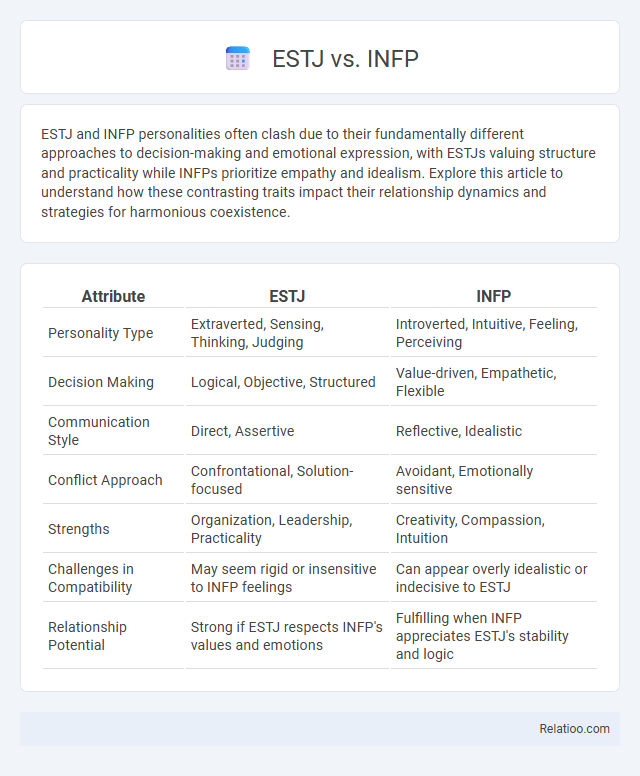ESTJ and INFP personalities often clash due to their fundamentally different approaches to decision-making and emotional expression, with ESTJs valuing structure and practicality while INFPs prioritize empathy and idealism. Explore this article to understand how these contrasting traits impact their relationship dynamics and strategies for harmonious coexistence.
Table of Comparison
| Attribute | ESTJ | INFP |
|---|---|---|
| Personality Type | Extraverted, Sensing, Thinking, Judging | Introverted, Intuitive, Feeling, Perceiving |
| Decision Making | Logical, Objective, Structured | Value-driven, Empathetic, Flexible |
| Communication Style | Direct, Assertive | Reflective, Idealistic |
| Conflict Approach | Confrontational, Solution-focused | Avoidant, Emotionally sensitive |
| Strengths | Organization, Leadership, Practicality | Creativity, Compassion, Intuition |
| Challenges in Compatibility | May seem rigid or insensitive to INFP feelings | Can appear overly idealistic or indecisive to ESTJ |
| Relationship Potential | Strong if ESTJ respects INFP's values and emotions | Fulfilling when INFP appreciates ESTJ's stability and logic |
Understanding ESTJ and INFP: An Overview
ESTJ personalities are characterized by their practical, organized, and decisive nature, while INFPs are driven by deep values, creativity, and empathy. Understanding these differences allows you to appreciate how ESTJs approach life with structure and logic, whereas INFPs prioritize harmony and idealism. This dynamic contrast in temperament and communication styles often shapes the chemistry between ESTJ and INFP individuals.
Core Personality Traits of ESTJ
ESTJ personalities exhibit strong organizational skills, decisiveness, and a preference for structure, which contrasts with the empathetic, idealistic nature of INFPs in chemistry partnerships. ESTJs prioritize logic, efficiency, and practical solutions, fostering a dynamic environment where their authoritative and grounded traits balance the INFP's introspective and value-driven approach. This complementary interaction often enhances problem-solving and innovation in chemistry through the blend of ESTJ's pragmatic leadership and INFP's creative intuition.
Core Personality Traits of INFP
INFPs are characterized by their deep idealism, strong value system, and empathetic nature, prioritizing authenticity and emotional harmony in interactions. Unlike ESTJs, who are practical, structured, and assertive leaders focused on efficiency and order, INFPs emphasize creativity, introspection, and personal growth. The chemistry between ESTJ and INFP often relies on complementary traits: ESTJ's decisiveness balances INFP's sensitivity, while INFP's emotional insight softens ESTJ's rigidity, fostering mutual understanding through contrasting core personality traits.
Key Differences Between ESTJ and INFP
ESTJ personalities are organized, pragmatic leaders who prioritize structure and efficiency, while INFPs are introspective, value-driven idealists focused on harmony and personal meaning. Your interactions may highlight the ESTJ's preference for objective facts and clear rules contrasted with the INFP's emphasis on emotions and individual authenticity in chemistry. Understanding these key differences enhances communication and collaboration by aligning practical decision-making with empathetic insight.
Communication Styles: ESTJ vs INFP
ESTJ communication is direct, concise, and task-focused, prioritizing clarity and efficiency in conveying information, often using assertive language and expecting prompt responses. INFP communication is more reflective, empathetic, and value-driven, emphasizing emotional nuance and personal meaning, often using metaphorical or expressive language to connect on a deeper level. The interaction between ESTJ's structured approach and INFP's introspective style often requires mutual adaptation to balance objective facts with subjective feelings for effective dialogue.
Decision-Making Approaches Compared
ESTJs rely on structured, logical decision-making processes emphasizing facts and efficiency, making choices quickly and confidently. INFPs prioritize values, emotions, and personal beliefs, often reflecting deeply to ensure decisions align with their authentic selves. Chemistry between these types may require balancing ESTJ's practical decisiveness with INFP's idealistic and empathetic approach to reach harmonious outcomes.
Conflict Resolution: ESTJ Versus INFP
ESTJ individuals approach conflict resolution with logical analysis and structured problem-solving, emphasizing clear rules and practical outcomes, while INFPs prioritize harmony and empathy, seeking to understand emotions and underlying values during disputes. ESTJs may perceive INFPs as overly sensitive or indirect, whereas INFPs might view ESTJs as rigid or dismissive of feelings. Effective conflict resolution between ESTJ and INFP types requires balancing objective logic with emotional insight to reach mutually respectful agreements.
Relationship Dynamics Between ESTJ and INFP
The relationship dynamics between ESTJ and INFP personalities highlight a blend of practicality and idealism, where the ESTJ's structured approach complements the INFP's values-driven perspective. ESTJs prioritize organization and efficiency, often providing stability and clear direction, while INFPs contribute empathy and deep emotional insight, fostering mutual growth. Effective communication and respect for each other's differences are essential for harmony in ESTJ-INFP partnerships, balancing logical decision-making with heartfelt understanding.
Strengths and Challenges in Collaboration
ESTJs excel in structure and decision-making, providing clear leadership and efficiency, while INFPs bring creativity, empathy, and idealism that foster innovative and harmonious environments. Your collaboration thrives when ESTJs' organization balances INFPs' adaptability, yet challenges arise from differing communication styles and approaches to conflict resolution. Strength lies in combining ESTJ's practicality with INFP's emotional insight to achieve well-rounded solutions, though patience and mutual respect are essential for overcoming potential misunderstandings.
Personal Growth Tips for ESTJ and INFP
ESTJ personalities thrive by establishing structured goals and embracing practical feedback, which enhances their natural leadership and organizational skills. INFP individuals benefit from reflective journaling and exploring creative outlets, helping to align their values with personal growth and emotional well-being. Both types grow effectively through mutual understanding of their contrasting communication styles, fostering empathy and balanced interpersonal dynamics.

Infographic: ESTJ vs INFP
 relatioo.com
relatioo.com